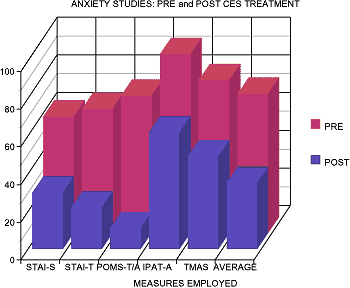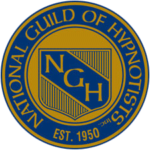 Seven separate studies of 220 hospitalized psychiatric inpatients. All were controlled scientific studies employing measures of anxiety with known reliability and validity. There are four replications using the state anxiety scale (STAI-S) and three using the tension/anxiety factor on the Profile of Mood States (POMS-T/A). Most of the studies were for fifteen days-Monday through Friday over a period of three weeks. The TMAS (Taylor Manifest Anxiety Scale) study was for ten days only and the IPAT (Institute for Personality and Ability Testing) for six. Studies using the STAI-S used five or six thirty minute sessions whereas one of the POM-T/A studies used CES for thirty minutes a day over ten days and two others at a rate of one forty minute session per day for fifteen days
Seven separate studies of 220 hospitalized psychiatric inpatients. All were controlled scientific studies employing measures of anxiety with known reliability and validity. There are four replications using the state anxiety scale (STAI-S) and three using the tension/anxiety factor on the Profile of Mood States (POMS-T/A). Most of the studies were for fifteen days-Monday through Friday over a period of three weeks. The TMAS (Taylor Manifest Anxiety Scale) study was for ten days only and the IPAT (Institute for Personality and Ability Testing) for six. Studies using the STAI-S used five or six thirty minute sessions whereas one of the POM-T/A studies used CES for thirty minutes a day over ten days and two others at a rate of one forty minute session per day for fifteen days
Graphical Interpretation
The red bar represents the patients’ scores on the anxiety measure before CES treatment (PRE); the blue bar, their score after CES therapy (POST).
Results
The findings of all tests conducted were consistent: Most patients responded positively to CES treatment within the first week or ten days; the more entrenched forms of anxiety, within ten days to three weeks. Resultant post CES test scores shows improvement ranging from approximately 30 percent to almost 65 percent. The variation was due to different anxiety scales measuring different facets of anxiety, only some of which are shared in common. In one study, investigators deliberately used patients with low suggestibility levels and compared them with those with high suggestibility levels. No differences were found, thus ruling out a placebo effect.
The net result of these studies shows CES to be a predictably effective treatment for anxiety and related disorders as measured by these scales. There has never been a controlled study of anxiety in which CES patients did not improve more significantly than did the controls.
The above was copied with permission from Neuro-Fitness LLC







